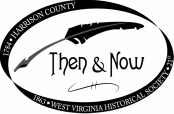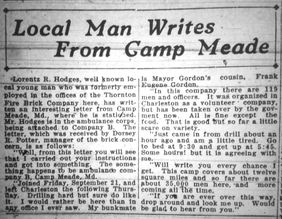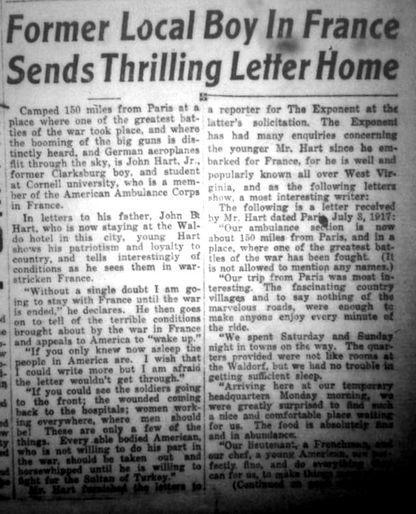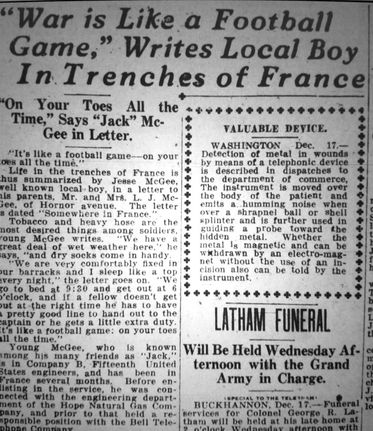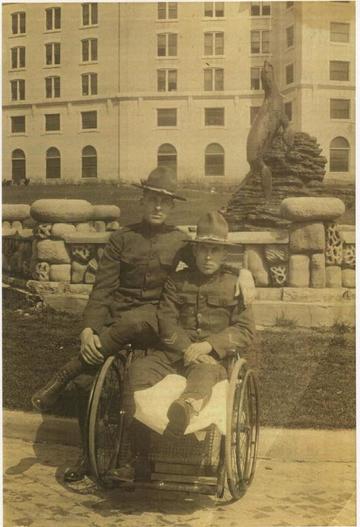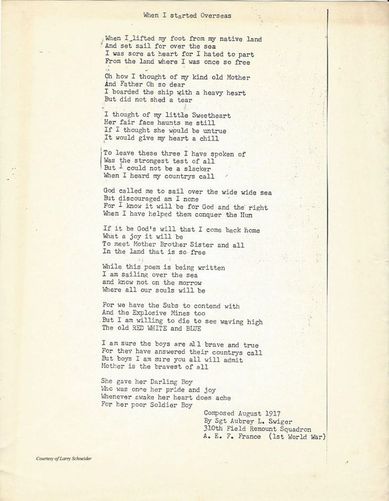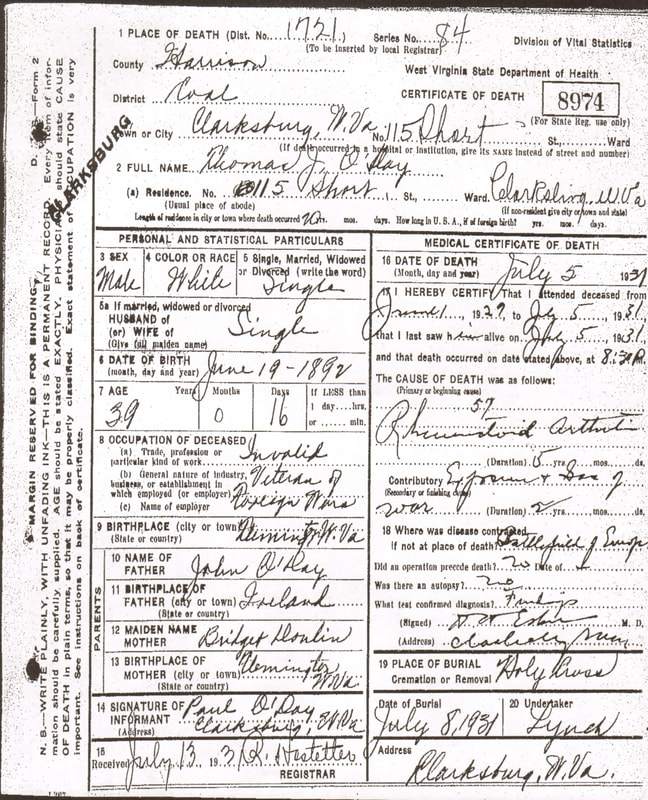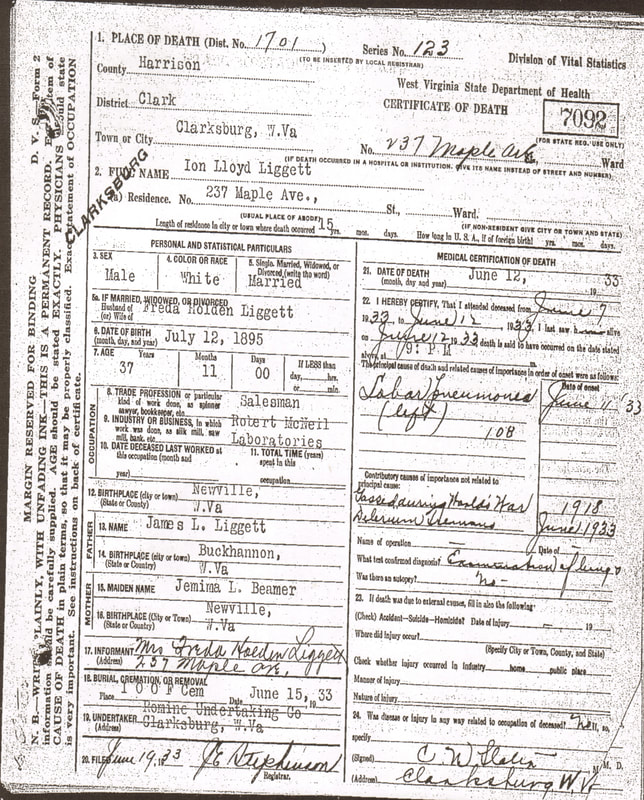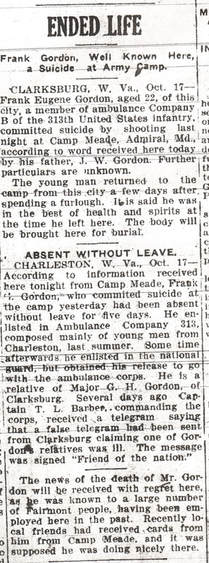Soldiers leaving for the front had a major impact on their community. There where a total of 2,129 people who served during World War I in Harrison County. 77 of those people lost their lives while serving.
|
Roy E. Parrish, Clarksburg
Cecil Orr Britton, Clarksburg Earl Jones, Clarksburg Duwain E. Kellar, Clarksburg Henry Clyde Snider, Clarksburg John H. Summers, Clarksburg Dewey S. Hildreth, Sardis Mike Amodia, Reynoldsville John H. Snyder, Meadowbrook Ray O. Skidmore, Gypsy William Tittle, Gypsy Roy E. Burroughs, Clarksburg Nicola Maido, Clarksburg James Alfred Haught, Bristol Herbert F. Garner, North View Edward John Pollard, Clarksburg Gale Hamrick, Adamston Percy Hale Samples, Salem Truman E. Tichnell, Shinnston George Dewey Griffith, Clarksburg Joe Vendura, Clarksburg Clarence E. Kennedy, Clarksburg Tony Carvelle, Lumberport John William Collins, Clarksburg Earl Adams, Enterprise |
Freeman G. Squires, IndustrialRay Sanders, Clarksburg
Antonio Ravenda, Clarksburg Carl Evans Robey, Sardis Clyde Robinson, Clarksburg Raleigh A. Duty, Clarksburg Fernando A. Robinson, Clarksburg Tom Dunbar Halliday, Clarksburg Ray B. Cropp, Bridgeport Mark McCann, Clarksburg Frank Smith Snyder, Meadowbrook Aubrey Layfield, Gypsy Andrew Joseph Kelley, Clarksburg James E. Dye, Mt. Clare Everett Archer, Clarksburg Romeo Arthur, Clarksburg William A. Shamblin, Haywood John Franklin McIntire, Shinnston Lucinda Rose, Clarksburg Charlie A. Martin, Hepzibah Russell Mash, Nutter Fort Lancelot A. Rose, Clarksburg Lummy M. Mason, Gypsy John C. Davis, Clarksburg Leroy Smith, Salem |
Edward Dobbs, McWhorter
Harrison H. Hildreth, Dola Lloyd Smith, Clarksburg John T. Keefe, Clarksburg Francesca Raquinta, Shinnston Malden A Schafer Anthony Guy Skidmore, Clarksburg Carl Maxwell, Adamston Charles S. Nuzum, Bridgeport Howard Leslie Robinson, Wyatt Francis P. O’Connor, Clarksburg Salthiel Hyde, Salem William Alexander, Clarksburg Elmus Elsworth Davis, Wallace Aubrey Carl Smith, Lost Creek Leslie S. Webb, Wallace Roy W. Lang, Bridgeport Dallas Looman, Oakdale Arthur J. Looman, Oakdale Glen Wyatt, Clarksburg Melvin Hildreth Rinehart James A. Hays Charles H. Hite Arza C. Wright, Bridgeport Earnest L. Pond |
Soldiers where not only killed during battle. Of the 77 people killed from Harrison County:
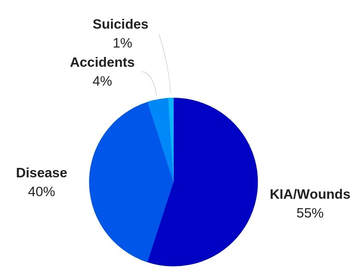
42 of 77 were killed in action or died of wounds
31 of 77 died of disease (which included pneumonia/Spanish influenza, meningitis, septicemia)
3 of 77 died as a result of an accident
1 of 77 died as a result of a suicide
31 of 77 died of disease (which included pneumonia/Spanish influenza, meningitis, septicemia)
3 of 77 died as a result of an accident
1 of 77 died as a result of a suicide
The above list is likely incomplete. If you know of anyone who was killed please contact us at [email protected] so we can honor their sacrifice.
Writings From The Front
While they were at war, soldiers often sent poignant letters and stories home of their life in the war. Men and women would send them to their families and even to the local newspapers as seen below.
Letter from Corporal F. E. Delbridge in Veuxhaulles, France to Virginia Wood of Clarksburg, WV dated January 2, 1919
Veuxhaulles, Fr.
Thursday, Jan. 2, ‘19
Dear Virginia,
Please accept my sincere thanks for the Xmas card just received from you. I guess it has been only negligence on my part that I have not written to you before this but my intentions have surely been good.
Well, Virginia this is a great country over here but it surely does rain. I suppose Carleton has written you giving vivid description of it. I understand that he came over sometime before I did.
We left Hoboken on the 30th of September on board the transport George Washington. Were on board until October 13th and anchored at Brest, Fr. on that date. I suppose Carleton also landed there. We were there until about the 21st and then travelled four days and nights to a little village, Torcenay, southeast of Paris, about eight miles from Langres, which you can probably find on the map. We were not fortunate enough to go by way of Paris, but passed through Tours, Le Mans and Dijon. At present we are about a half mile out from Veuxhaulles, a small village about twenty miles from Chaumont, General Pershing’s Headquarters. We are in barracks and are more comfortably situated than we have been at any time since leaving the States. Have electric lights, shower bath and all other modern conveniences including paved streets.
You should see us working on the streets breaking rock. You would think it was the Harrison County “road gang” working on the road to the “County Seat!”
We certainly had a dandy Xmas, better than you folks at home can realize I suspect. In the morning we assembled at the “Y” down in the village and each of us was given a package through the Red Cross and Y.M.C.A. containing cigarettes, candy, cigars, chewing gum and smoking tobacco. In the afternoon we went over to Montigny to a party given by the American soldiers for the children of that village.
Received a box from home on the 28th and believe me sure did cheer me up. You can realize how a package from home “makes a feller feel.”
Don’t know what to say as to coming home but hope to in the near future. I would like to have Carleton’s address so I can write him.
Suppose the Alumni are going to have a big banquet this spring. Sure hope to be back in time to take part in it.
Well, Virginia, I guess this is all tonight. Remember me to all the “bunch”.
Sincerely,
Buzz, ‘13
Co B. 605 Engineers
A.E.F.
Thursday, Jan. 2, ‘19
Dear Virginia,
Please accept my sincere thanks for the Xmas card just received from you. I guess it has been only negligence on my part that I have not written to you before this but my intentions have surely been good.
Well, Virginia this is a great country over here but it surely does rain. I suppose Carleton has written you giving vivid description of it. I understand that he came over sometime before I did.
We left Hoboken on the 30th of September on board the transport George Washington. Were on board until October 13th and anchored at Brest, Fr. on that date. I suppose Carleton also landed there. We were there until about the 21st and then travelled four days and nights to a little village, Torcenay, southeast of Paris, about eight miles from Langres, which you can probably find on the map. We were not fortunate enough to go by way of Paris, but passed through Tours, Le Mans and Dijon. At present we are about a half mile out from Veuxhaulles, a small village about twenty miles from Chaumont, General Pershing’s Headquarters. We are in barracks and are more comfortably situated than we have been at any time since leaving the States. Have electric lights, shower bath and all other modern conveniences including paved streets.
You should see us working on the streets breaking rock. You would think it was the Harrison County “road gang” working on the road to the “County Seat!”
We certainly had a dandy Xmas, better than you folks at home can realize I suspect. In the morning we assembled at the “Y” down in the village and each of us was given a package through the Red Cross and Y.M.C.A. containing cigarettes, candy, cigars, chewing gum and smoking tobacco. In the afternoon we went over to Montigny to a party given by the American soldiers for the children of that village.
Received a box from home on the 28th and believe me sure did cheer me up. You can realize how a package from home “makes a feller feel.”
Don’t know what to say as to coming home but hope to in the near future. I would like to have Carleton’s address so I can write him.
Suppose the Alumni are going to have a big banquet this spring. Sure hope to be back in time to take part in it.
Well, Virginia, I guess this is all tonight. Remember me to all the “bunch”.
Sincerely,
Buzz, ‘13
Co B. 605 Engineers
A.E.F.
Letter from John Hart, Jr. to his father, John Hart, Sr. Published in the Clarksburg Exponent on August 28, 1917
“Somewhere in France”
July 30, 1917
Dear Father,
Don’t think that I am writing this letter to scare you, because by the time you receive it the most dangerous part of my work will be over, and I’ll be way back of the lines.
How foolish we were not to enjoy twice as much as we did, the paradise of the little town we were eager to leave. We grew impatient, we wanted action, and believe me, we are now getting it.
Leaving that place Monday the 23rd, we arrived here, at our headquarters (15 miles back of the lines) the same day. The boys of section (?) whom we were replacing, looked at us with pitiful eyes, for they had been here 28 days, and they knew what the work was like.
Monday afternoon I received orders to be ready to go to the front Tuesday at 5:30 a.m., and I admit that my night’s rest was not the very best, because I was realizing more and more the danger.
The next morning at the appointed time, four drivers, each with an orderly, started out. All of us were wearing steel helmets and had gas masks ready. In appearance we were ready for anything, but down in our hearts, none of us were prepared at all.
At the front, we have two “postes de secours,” one to the rear a mile and a half behind the third line trenches, and the other one advanced less than 200 yards back. Four cars go up every 24 hours and relieve the four that are there. We work from 6 a.m. to 6 a.m. every second day. When an advanced ambulance is loaded with wounded, it starts back to the hospital, a drive of 10 miles. When passing the rear post, that is the signal for one of the drivers there to go immediately to the advanced post and so on.
The first morning out I was one of the drivers that remained in the rear. From the moment we left here (headquarters) until we reached our destination, the sound of the guns and shells grew more and more distinct, and all of us became more and more scared. When we arrived at the post, we found ourselves surrounded by French batteries.
At that stage of the game, we could not distinguish between the roar of the French guns and the boom of an arriving Boche shell, and believe me it was the most frightened crowd of fellows you ever saw. Two of us with our orderlies remained here and the other two drivers went on.
It was an hour before one of the cars came back, so we had one hour to sit in the ambulance and try to collect our entire selves. Here were four of us, never before under shell fire, waiting to go to a place far more subjected to shells and consequently far more dangerous. When a person says he wasn’t scared the first time under shell fire, he lies--that’s all. It is no disgrace to say that I was afraid and greatly afraid. None of us ever passes such a hopeless hour in our lives.
There was a simultaneous feeling of fear, hopelessness, helplessness, depression, and many other things that I can never explain. Our faces lengthened by a mile, and how homesick we were. Each new bang sent a hundred new impressions through our heads and each one seemed to terrify. Already we were sick of it all and ready to go home. It was tough, awfully tough but we gritted our teeth, took on a fatalist’s view of life, and you would be surprised to see how brave we have become.
The first car had now come in, and it was now my turn to go. My little Ford took me along very rapidly and soon I was in full view of the French and German trenches and “No Man’s Land.” Then I saw the remains of what was once a town where our post was located. The sight of the whole thing made me gasp. I was horrified to think that civilized people could let such a thing as this go on. It is usually quiet early in the morning so no shells came near us. However, the road was filled with shell holes and in a rotten condition, but “Lizzy” took me in safety and in a hurry. When I reached the postem, a shattered old mansion, the entire basement of which is used as a dressing station, and “abri” (dugout), I stopped and gazed around for a moment. The town made me think of an old ruined, deserted village once stricken with leprosy. What a sight and the smell connected with it, as one boy said, “It is the smell of death.”
The ruins, the corpses, the blood, the odor, the cries of the wounded, the roar of guns, the shrieking of shells, just imagine yourself for the first time surrounded by such living things. I felt scared and weak and I hurried into the ambulance.
This is about the worst poste on the entire Western front, but luckily it was a comparatively quiet day and I only had to make four trips in the day and two at night.
Leaving at night under shell fire, no lights, passing continually trains of trucks, food wagons, artillery, soldiers, is accompanied with many new thrills and exciting moments.
The worst feeling at night though is being on the road in view of the Germans and have a star shell burst over your head, making you a perfect target. One feels like a baby in the clutches of a lion.
It was wonderful to be relieved at 6 a.m., and to get back to camp, where we could feel safe and also get some sleep.
Our camp is fairly comfortable, and the food, although very poor at first, is gradually improving. Entirely against my tongue’s wishes, I have in self defense, forced myself to like this “Pinard” red wine.
Something on the order of North Carolina chiggers have attacked me. The only thing I can say in their favor is that they give me plenty to do in my leisure hours.
My permission will come sometime in October when I hope I can take a trip somewhere in Southern France.
The Exponent’s editors state the following at the end of Hart’s letter: “Mr. Hart concludes his most interesting letter by stating that he hopes to be able to return to the United States this winter. He emphatically declares, however, that he will fight throughout the war with France.”
“Somewhere in France”
July 30, 1917
Dear Father,
Don’t think that I am writing this letter to scare you, because by the time you receive it the most dangerous part of my work will be over, and I’ll be way back of the lines.
How foolish we were not to enjoy twice as much as we did, the paradise of the little town we were eager to leave. We grew impatient, we wanted action, and believe me, we are now getting it.
Leaving that place Monday the 23rd, we arrived here, at our headquarters (15 miles back of the lines) the same day. The boys of section (?) whom we were replacing, looked at us with pitiful eyes, for they had been here 28 days, and they knew what the work was like.
Monday afternoon I received orders to be ready to go to the front Tuesday at 5:30 a.m., and I admit that my night’s rest was not the very best, because I was realizing more and more the danger.
The next morning at the appointed time, four drivers, each with an orderly, started out. All of us were wearing steel helmets and had gas masks ready. In appearance we were ready for anything, but down in our hearts, none of us were prepared at all.
At the front, we have two “postes de secours,” one to the rear a mile and a half behind the third line trenches, and the other one advanced less than 200 yards back. Four cars go up every 24 hours and relieve the four that are there. We work from 6 a.m. to 6 a.m. every second day. When an advanced ambulance is loaded with wounded, it starts back to the hospital, a drive of 10 miles. When passing the rear post, that is the signal for one of the drivers there to go immediately to the advanced post and so on.
The first morning out I was one of the drivers that remained in the rear. From the moment we left here (headquarters) until we reached our destination, the sound of the guns and shells grew more and more distinct, and all of us became more and more scared. When we arrived at the post, we found ourselves surrounded by French batteries.
At that stage of the game, we could not distinguish between the roar of the French guns and the boom of an arriving Boche shell, and believe me it was the most frightened crowd of fellows you ever saw. Two of us with our orderlies remained here and the other two drivers went on.
It was an hour before one of the cars came back, so we had one hour to sit in the ambulance and try to collect our entire selves. Here were four of us, never before under shell fire, waiting to go to a place far more subjected to shells and consequently far more dangerous. When a person says he wasn’t scared the first time under shell fire, he lies--that’s all. It is no disgrace to say that I was afraid and greatly afraid. None of us ever passes such a hopeless hour in our lives.
There was a simultaneous feeling of fear, hopelessness, helplessness, depression, and many other things that I can never explain. Our faces lengthened by a mile, and how homesick we were. Each new bang sent a hundred new impressions through our heads and each one seemed to terrify. Already we were sick of it all and ready to go home. It was tough, awfully tough but we gritted our teeth, took on a fatalist’s view of life, and you would be surprised to see how brave we have become.
The first car had now come in, and it was now my turn to go. My little Ford took me along very rapidly and soon I was in full view of the French and German trenches and “No Man’s Land.” Then I saw the remains of what was once a town where our post was located. The sight of the whole thing made me gasp. I was horrified to think that civilized people could let such a thing as this go on. It is usually quiet early in the morning so no shells came near us. However, the road was filled with shell holes and in a rotten condition, but “Lizzy” took me in safety and in a hurry. When I reached the postem, a shattered old mansion, the entire basement of which is used as a dressing station, and “abri” (dugout), I stopped and gazed around for a moment. The town made me think of an old ruined, deserted village once stricken with leprosy. What a sight and the smell connected with it, as one boy said, “It is the smell of death.”
The ruins, the corpses, the blood, the odor, the cries of the wounded, the roar of guns, the shrieking of shells, just imagine yourself for the first time surrounded by such living things. I felt scared and weak and I hurried into the ambulance.
This is about the worst poste on the entire Western front, but luckily it was a comparatively quiet day and I only had to make four trips in the day and two at night.
Leaving at night under shell fire, no lights, passing continually trains of trucks, food wagons, artillery, soldiers, is accompanied with many new thrills and exciting moments.
The worst feeling at night though is being on the road in view of the Germans and have a star shell burst over your head, making you a perfect target. One feels like a baby in the clutches of a lion.
It was wonderful to be relieved at 6 a.m., and to get back to camp, where we could feel safe and also get some sleep.
Our camp is fairly comfortable, and the food, although very poor at first, is gradually improving. Entirely against my tongue’s wishes, I have in self defense, forced myself to like this “Pinard” red wine.
Something on the order of North Carolina chiggers have attacked me. The only thing I can say in their favor is that they give me plenty to do in my leisure hours.
My permission will come sometime in October when I hope I can take a trip somewhere in Southern France.
The Exponent’s editors state the following at the end of Hart’s letter: “Mr. Hart concludes his most interesting letter by stating that he hopes to be able to return to the United States this winter. He emphatically declares, however, that he will fight throughout the war with France.”
The War's Affect On Returning Soldiers
Like with all wars, how it affected each soldier after they returned home varied.
Some soliders returned to Harrison County physically and emotionally scarred by the war. Mustard gas exposure and crippling wounds caused by bullets and artillery shells left many permanently disabled such as Thomas O’Day and Ion Liggett.
Unfortunately, some men could not cope with the pressures of military service or never healed from what they witnessed on the Front, and committed suicide. This was commonly referred to as “shell shock” at this time, and is now known as post-traumatic stress disorder (PTSD) which continues to afflict our service men and women today.
However, Many Harrison County veterans went on to find career success after serving in the military.
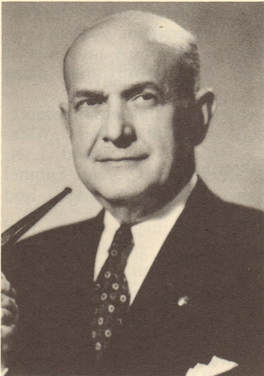
Louis A. Johnson
- Co-founder of Steptoe & Johnson
- National Commander of American Legion--1932
- Assistant U.S. Secretary of War--1937
- U.S. Secretary of Defense--1949-1950
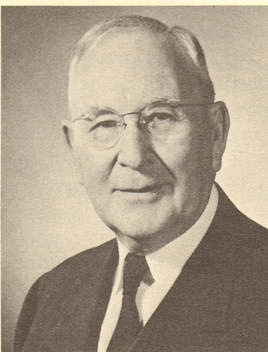
Dr. Frank V. Langfitt
- President of Harrison County Medical Society--1929
- President of WV State Medical Society--1940
- Co-founder & president of Monongahela Valley Hospital Service
- Incorporator of Union Protestant Hospital
- Board of Directors-Union National Bank--1932-1972
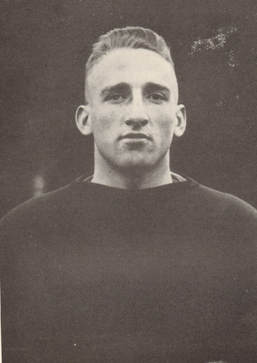
Clay B. “Mud” Hite
- Quarterback of the “great” 1919 West Virginia University football team
- Football and basketball coach of Washington Irving High School--1921-1951
- Member of the WV Sports Hall of Fame
Founding of New Veterans' Organizations
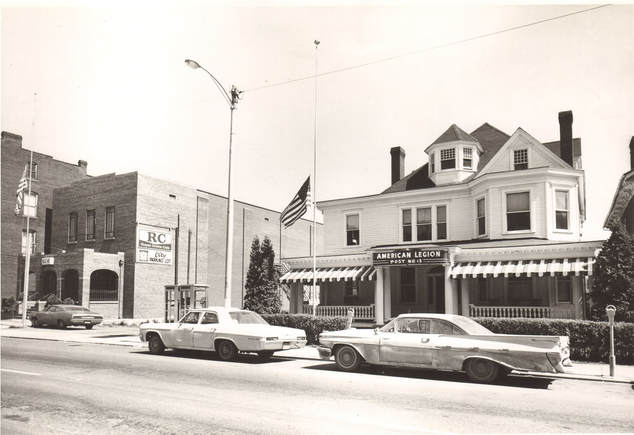 Clarksburg's Meuse-Argonne Post of the Veterans of Foreign Wars (left) and Roy E. Parrish Post No. 13 (right) ca. 1970. Harrison County WV Historical Society Collection.
Clarksburg's Meuse-Argonne Post of the Veterans of Foreign Wars (left) and Roy E. Parrish Post No. 13 (right) ca. 1970. Harrison County WV Historical Society Collection.
Veterans organizations were not a unique concept by the beginning of World War I. However, two new veterans organizations were born after the armistice in 1918: the American Legion and the Veterans of Foreign Wars.
On September 13, 1919, the first three American Legion posts were chartered in Harrison County: Roy E. Parrish Post No. 13 and William Alexander Post No. 38 (African-American veterans) in Clarksburg and Salem’s P. Hale Samples Post No. 35. The Carl Evans Robey Post No. 24 in Lumberport (chartered December 8, 1930), Shinnston Post No. 31 (chartered December 1, 1934), and Bridgeport Post No. 68 (chartered November 12, 1953) were other chapters formed much later after World War I.
The Meuse-Argonne Post of the Veterans of Foreign Wars was founded in Clarksburg on December 9, 1920. At its peak prior to 1950, the Meuse-Argonne VFW had more than 1,000 members which made it one of the largest VFW posts in West Virginia.
On September 13, 1919, the first three American Legion posts were chartered in Harrison County: Roy E. Parrish Post No. 13 and William Alexander Post No. 38 (African-American veterans) in Clarksburg and Salem’s P. Hale Samples Post No. 35. The Carl Evans Robey Post No. 24 in Lumberport (chartered December 8, 1930), Shinnston Post No. 31 (chartered December 1, 1934), and Bridgeport Post No. 68 (chartered November 12, 1953) were other chapters formed much later after World War I.
The Meuse-Argonne Post of the Veterans of Foreign Wars was founded in Clarksburg on December 9, 1920. At its peak prior to 1950, the Meuse-Argonne VFW had more than 1,000 members which made it one of the largest VFW posts in West Virginia.
